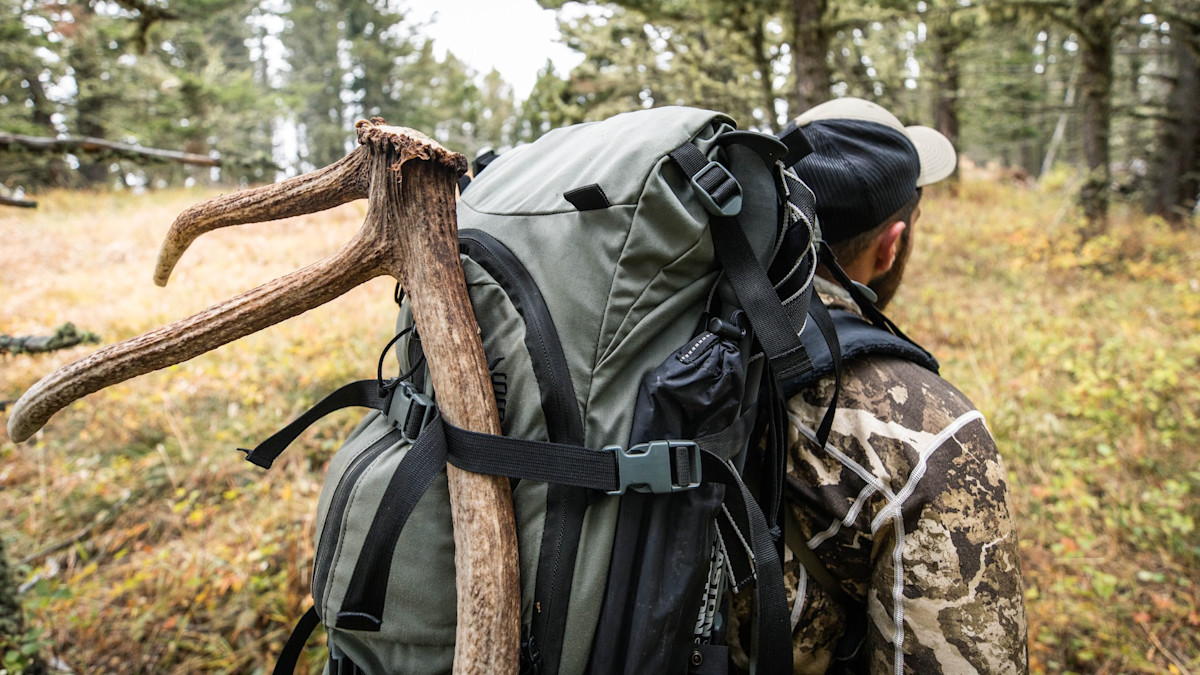
A bullet whizzes over my head, smashing into a rock a few feet behind me. Then another, and another. Three shots—an ominous warning directed at me and my two shed-hunting buddies. We’re deep on National Forest land in the last week of April, on an annual shed-hunting pilgrimage—something that’s become as annual a tradition as opening week elk camp.
We quickly consult each other on what to do. Screw ’em, was the consensus. We’re on public land, and wildlife is a public resource. We forge on, shuffling across a raging creek on a precarious log. But as we step foot on the other side, three more shots come flying our direction—even closer this time. The aggressor clearly has the higher ground, and we’re sitting ducks. Without a word, we simultaneously bail, sprinting for the closest cliff band where we’re hidden from above. We take a few minutes to collect ourselves, then decide to head somewhere else in search of antlers. The shooter has clearly laid an illegal claim to our desired country. We shuffle around the cliffs, tuck into a willow-choked creek bottom, and make for some different country, a sour taste lingering in our mouths.
Spend much time shed hunting in the West, and you might have similarly aggressive encounters with unscrupulous people. Perhaps not to the extent of getting shot at, but possibly angry run-ins at trailheads, threatening notes on dashboards, sabotaged equipment, and airplanes chasing elk around. There’s no doubt—shed hunting is out of control, and wildlife management agencies are taking note.
On a December 18th meeting, the Utah Wildlife Board heard a presentation from a special shed-antler gathering committee. The committee recommended establishing a nonresident shed-hunting season of May 31st to December 31st, while allowing residents to shed hunt year-round. However, both residents and nonresidents would be required to obtain permits—for adults over 18 that would mean both a base hunting license and a special shed-antler gathering permit.
The board didn’t vote on any changes at the December meeting, but plans to this summer—leaving ample time for public comment. New restrictions would go into place in the spring of 2025.
MeatEater’s Ryan Callaghan shared his thoughts on the potential regulations: “As we’ve seen through decades of human beings operating on the free market with wildlife, being able to pick this stuff up and sell it turns some people into monsters. They break laws, they push sensitive wildlife, even on harsh winters, into areas where there is no food...Most laws probably don’t need to exist if it weren’t for the bad actors. If the state intends to use the funds generated by this shed-gathering license to put more enforcement out there and regulate the behavior of these couple bad actors, then yeah, I can kind of see it.”
Utah wouldn’t be the first state to implement shed-hunting restrictions. Neighboring Wyoming has already closed the entire state west of the Continental Divide to the activity from January 1st through 6 a.m. on May 1 for residents and May 8 for nonresidents, giving residents a one-week leg up. Nonresidents must also purchase a $21.50 license to shed hunt.
The notorious shed opener in Jackson Hole is also slated for May 1st again this year. It’s a case-in-point on the need for tighter restrictions. Recently, it’s gotten so out of hand that this year, residents can reserve a spot in a Jackson Police motorcade for $20, giving them first access to public land bordering the National Elk Refuge.
Montana has similar openers on a handful of Wildlife Management Areas—state lands with special access restrictions to protect wildlife—that result in mayhem when they open for the year, usually in early- or mid-May. Horses, foot traffic, and ATVs (where permitted) swarm the winter ranges, sending deer or elk that haven’t already made for higher country fleeing.
Colorado, meanwhile, has taken a similar approach as Wyoming, restricting antler hunting from January 1st through April 30th on all land west of Interstate 25, which traverses north-south along the Front Range, effectively closing all of Colorado’s mountains until May.
But as shed hunting continues to grow in popularity, more restrictions seem inevitable—and much needed. It also begs the question: should the sale of antlers be illegal? And if it were illegal, would it even curb the growth of the activity?
Every state currently prohibits the sale of wild game meat. However, they do not prohibit the sale of heads, hides, mounts, or shed antlers (some states do prohibit the collection of dead heads, however). Why the distinction between meat and antlers? Both can command well over $20 per pound on the market. While meat is physically consumed, antlers are also consumed by ultra-wealthy landowners in Jackson, Big Sky, and beyond, who feel the need to bring the Wild West into their living rooms in the form of antler chandeliers for their guests to admire over happy hour cocktails.
But many shed hunters aren’t interested in the money at all. They do it to explore new country, get in shape for the season, and spend time in the woods. However, thanks to the sheer popularity of the sport—resulting in increased competition for a limited resource—and a handful of trigger-quick bad apples or otherwise aggressive individuals, something needs to change. Those changes are likely to be state-by-state and will likely be increasingly common in the coming years. For now, though, avoid pushing animals off their winter ranges, and bear in mind our collective stewardship responsibility for wildlife when hitting the woods this spring.





